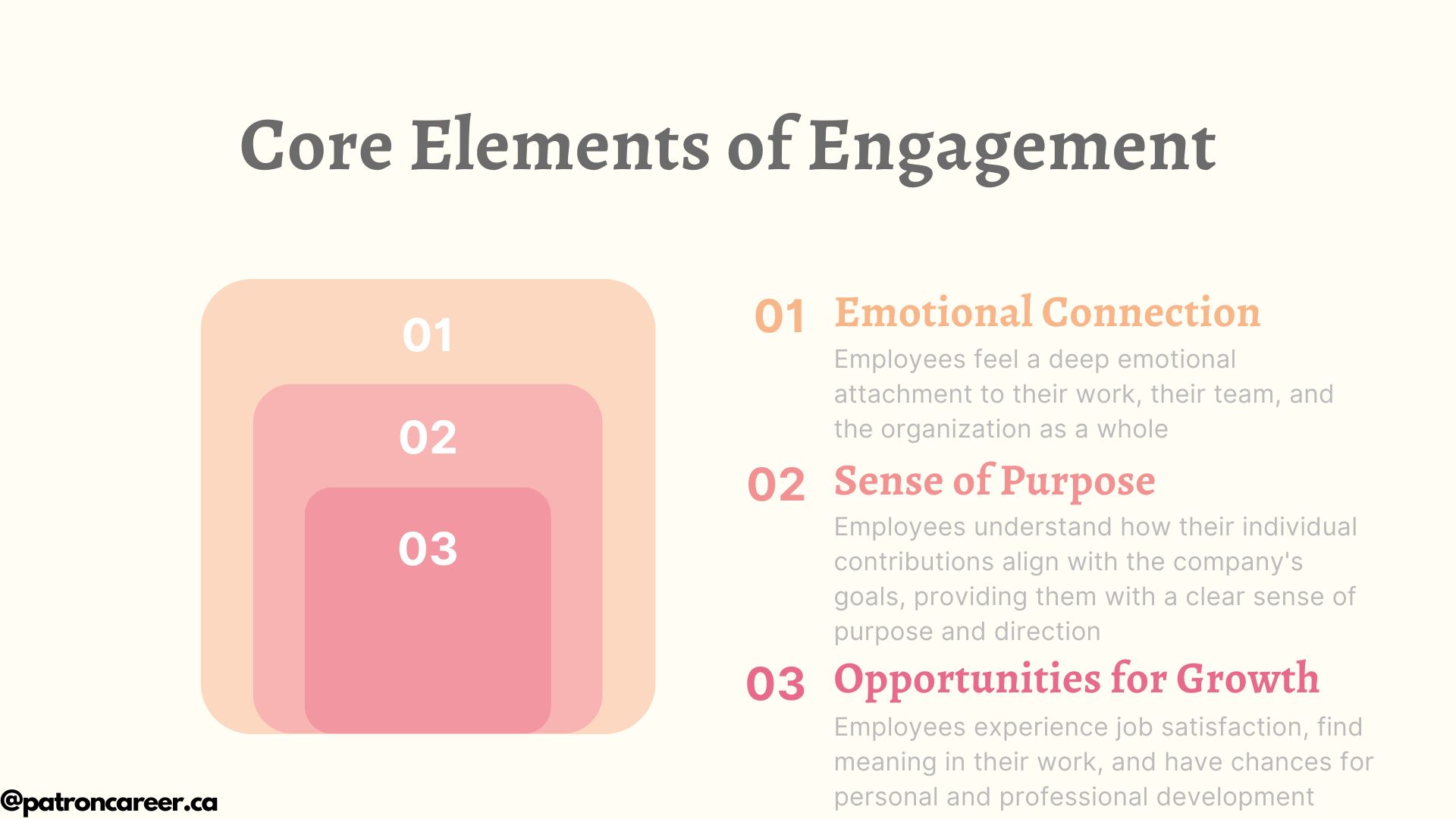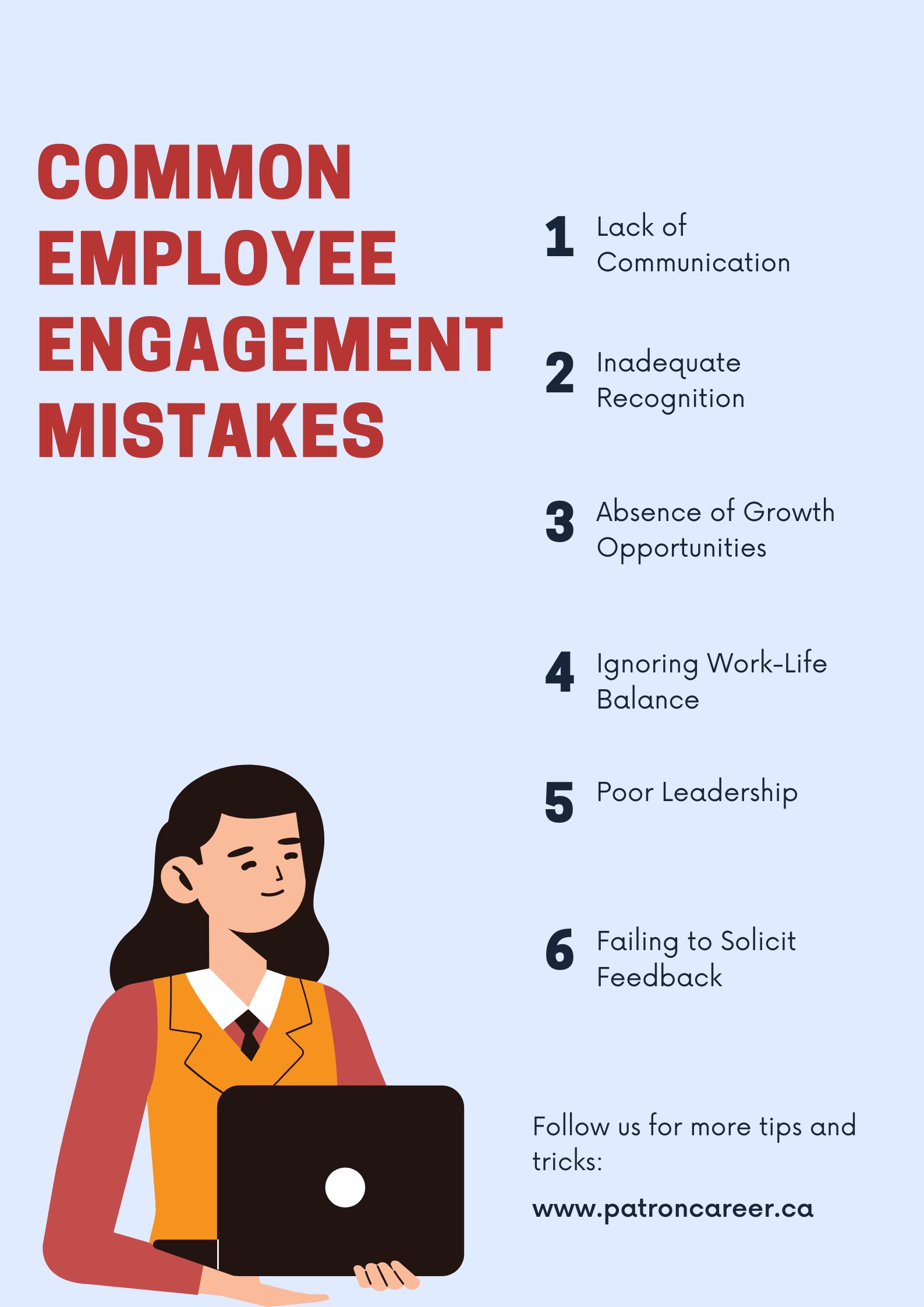
Business Analysis Skills for HR Managers
5 February, 2024
Patron Career Staffing firmly believes in adopting a tailored approach to meet temporary and permanent recruitment needs. We safeguard the interest of our clients by finding such workers who are knowledgeable and reliable.
About UsNeed help? Make a Call
32 Dundas Street East Unit A, L5A1W2

Let’s face it. Everything ties back to one core component in a business’s lifecycle- employee engagement. It is normal for employees to feel disengaged at work. Energy levels and motivation may stoop low owing to a variety of factors. With engagement strategies in place, employees are likely to feel committed to their work and the productivity, presenteeism and profitability of the company also increase. Engagement has also been shown to impact morale, collaboration, company culture and ultimately, the success of a business entity.
Canadian workplaces, that strive for excellence and efficiency, place reliance on the upbringings of employees through engagement. It is crucial to invest in the happiness of employees as it helps the organization to grow. Knowing how and where to invest to shift from disengagement to engagement is essential for organizations aiming to nurture a motivated and productive workforce.
Let us first get to know what employee engagement deals with.
Understanding Employee Engagement
Employee engagement can be described as the connection, commitment, and satisfaction that an employee feels towards the organization and its goals. It is a wide concept which depicts not only an employee’s satisfaction with their job role but also how they are content, invested, motivated and passionate about their position in your company. Engaged employees yield better results than a disengaged workforce. They go above and beyond their job descriptions, contribute invaluably, brainstorm ideas, and actively seek ways to improve product and service pipelines. It is a two-way street where efforts are required from both sides:
The employer who invests to address the concern of engagement, and
The employee who commits intensely to his work.
Related: Boosting Employee Morale and Engagement through Effective Incentives
Why Is Employee Engagement So Important?
For the Company’s Well-Being:
Increased Productivity: one of the far-reaching benefits that engagement portrays is augmented productivity. Work engagement helps employees to retain focus, motivation and dedication towards work. They are willing to invest extra effort to achieve organizational goals, driving overall performance.
Higher Retention Rates: companies aiming to reduce turnover should strive to boost workforce engagement so that employees are willing to stay with you for a longer duration. Lower turnover rates reduce recruitment and training costs while preserving institutional knowledge and expertise within the organization.
Enhanced Customer Satisfaction: Engaged employees are more likely to provide excellent customer service. Their enthusiasm and dedication translate into better interactions with customers, leading to increased satisfaction, loyalty, and repeat business.
Innovation and Creativity: Engaged employees affect a variety of organizational aspects including innovation. Engaged employees, feel empowered to share their insights and perspectives, fostering a culture of creativity and continuous improvement within the organization.

For the Employee’s Well-Being:
Job Satisfaction: The distinction between talent acquisition and recruitment lies in their scope, approach, and strategic focus within the broader realm of human resource management. While both processes involve attracting and hiring individuals to fill organizational roles, they differ significantly in their methodologies and objectives.
Career Growth Opportunities: Engaged employees are more likely to seek out and take advantage of opportunities for growth and advancement within the organization. They are committed to their professional development and motivated to excel in their roles.
Work-Life Balance: job burnout is real and is evident from various reports depicting modern-day employees under the umbrella of stress and unhappiness at work. To avoid it, strive to accomplish work-life balance by disuniting life at home and work.
Sense of Purpose and Meaning: Engaged employees feel a sense of purpose and meaning in their work. They understand how their contributions contribute to the organization's success and feel invested in its mission and objectives.
Personal Well-Being: Engaged employees experience higher levels of overall well-being, including physical, mental, and emotional health. They feel happier, more fulfilled, and more resilient in the face of challenges.
How Can Employee Engagement Levels be Raised in an Organization?
To be in the same boat, concerted efforts are required from both the management (employers) and the workforce (employees). Without such interconnection, achieving engagement may become a distant goal for the organization. Employers play a crucial role in creating a supportive work environment and providing opportunities for growth and development. This may include offering competitive compensation and benefits, promoting work-life balance, incorporating training regimes and recognizing and rewarding employees for their contributions.
On the other hand, employees also have a responsibility to actively engage in their work and seek ways to enhance their job satisfaction and fulfilment. Here are ten practical tips for Canadian employees to boost their engagement at work:
1. Set Clear Goals: formulating a strategic plan of action is recommended to set out what one wants to achieve during a given period. Focus on defining clear, actionable objectives for yourself, and align them with the organizational mission and goals and not with your colleagues. Goal-setting will help you create a roadmap to your career progression.
If you want to know more about how you can set professional goals, read our newsletter, here!
2. Develop Your Skills: employees must firsthand aim to do something about their engagement competency at work. You can upskill yourself by engaging in training and development opportunities at your workplace. This way you can keep up with the competitive trends around you and enhance your expertise and knowledge.
Related: STAFF TRAINING METHODS EVERY EMPLOYER SHOULD KNOW ABOUT.
3. Build Relationships: one essential knack to upgrade engagement is to constantly strive to build meaningful connections and positive relationships with employers and colleagues. When working as a team, offer support, actively listen, communicate clearly and seek feedback to address any ordeal.
4. Take Ownership: at work, setbacks are common. Show accountability for your actions. Demonstrate initiative, responsibility, and an upbeat attitude in tackling challenges and finding solutions.
5. Maintain Work-Life Balance: Strive to maintain a healthy balance between work and personal life. Set boundaries, prioritize self-care, and make time for activities that revitalize and energize you.

6. Seek Feedback: employees often feel astray without constructive feedback. Dejection, demotivation, and confusion escalates. To redeem yourself from such deplorable effects, periodically solicit feedback from your peers and managers to gain insights into your areas of improvement and become your best self. Use feedback constructively to enhance your skills and grow professionally.
7. Stay Positive: Maintain a positive attitude, even in challenging situations. Focus on solutions rather than dwelling on problems, and celebrate successes, no matter how small.
9. Embrace Change: Be adaptable and open to change. Embrace new technologies, processes, and ideas that can improve efficiency and effectiveness in your work.
10. Celebrate Diversity: Participate in a company-wide effort to embrace diversity and inclusion in the workplace. Acknowledge differences and portray a cordial attitude with other employees. Humanize the workplace appreciate the unique perspectives and backgrounds of your colleagues, and actively contribute to creating an inclusive work environment.
Here's to a Brighter, More Engaged Future at Work!
Simply put, employee engagement matters for organizational success and growth. Without it, the company kingdom may become vulnerable to various external and internal threats like high turnover, low production scales, diminished reputation and loss of brand image. Therefore, it’s a strategic imperative to address employee engagement in your company. Canadian employees can follow the above tips to sustain themselves in a highly competitive business landscape and ensure their long-term professional success.
Organizations can stand out from another regular workplaces by using strategic tactics to elevate the engagement of employees at work. That way, both the workforce and the company can function better.
In case you find yourself struggling to maintain engagement at work, don’t hesitate to reach out to PCS for tailored support and guidance.
